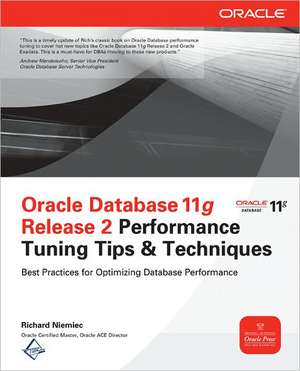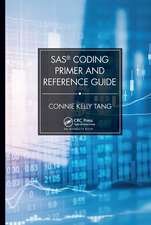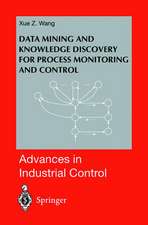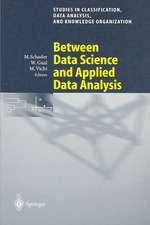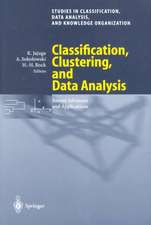Oracle Database 11g Release 2 Performance Tuning Tips & Techniques
Autor Richard Niemiecen Limba Engleză Paperback – 16 mai 2012
Publisher's Note: Products purchased from Third Party sellers are not guaranteed by the publisher for quality, authenticity, or access to any online entitlements included with the product.
Implement Proven Database Optimization Solutions
Systematically identify and eliminate database performance problems with help from Oracle Certified Master Richard Niemiec. Filled with real-world case studies and best practices, Oracle Database 11g Release 2 Performance Tuning Tips & Techniques details the latest monitoring, troubleshooting, and optimization methods. Find out how to find and fix bottlenecks, configure storage devices, execute effective queries, and develop bug-free SQL and PL/SQL code. Testing, reporting, and security enhancements are also covered in this Oracle Press guide.- Properly index and partition Oracle Database 11g Release 2
- Work with Oracle Exadata and Oracle Exalogic Elastic Cloud
- Efficiently manage disk drives, RAID arrays, and memory
- Tune queries with Oracle SQL hints and the TRACE utility
- Troubleshoot databases using V$ views and X$ tables
- Distribute workload using Oracle Real Application Testing
- Generate reports using Oracle's Statspack and Automatic Workload Repository tools
- Use sar, vmstat, and iostat to monitor system statistics
Preț: 425.84 lei
Preț vechi: 532.30 lei
-20% Nou
Puncte Express: 639
Preț estimativ în valută:
81.51€ • 84.77$ • 68.30£
81.51€ • 84.77$ • 68.30£
Carte disponibilă
Livrare economică 20 februarie-06 martie
Preluare comenzi: 021 569.72.76
Specificații
ISBN-13: 9780071780261
ISBN-10: 0071780262
Pagini: 1184
Dimensiuni: 211 x 226 x 58 mm
Greutate: 1.88 kg
Editura: McGraw Hill Education
Colecția McGraw-Hill
Locul publicării:United States
ISBN-10: 0071780262
Pagini: 1184
Dimensiuni: 211 x 226 x 58 mm
Greutate: 1.88 kg
Editura: McGraw Hill Education
Colecția McGraw-Hill
Locul publicării:United States
Cuprins
Chapter 1. Introduction to 11g R1 and R2 New Features (DBA and Developer)
Chapter 2. Basic Index Principles (Beginner Developer and Beginner DBA)
Chapter 3. Disk Implementation Methodology and ASM (DBA)
Chapter 4. Tuning the Database with Initialization Parameters (DBA)
Chapter 5. Enterprise Manager and Grid Control (DBA and Developer)
Chapter 6. Using EXPLAIN and SQL PLAN MANAGEMENT (Developer and DBA)
Chapter 7. Basic Hint Syntax (Developer and DBA)
Chapter 8. Query Tuning: Developer and Beginner DBA
Chapter 9. Table Joins and Other Advanced Tuning (Advanced DBA and Developer)
Chapter 10. Using PL/SQL to Enhance Performance (Developer and DBA)
Chapter 11. Exadata, Tuning RAC, and Using Parallel Features
Chapter 12. The V$ Views (Developer and DBA)
Chapter 13. The X$ Tables (Advanced DBA)
Chapter 14. Using Statspack and the AWR Report to Tune Waits, Latches, and Mutexes
Chapter 15. Performing a Quick System Review (DBA)
Chapter 16. Monitor the System Using Unix Utilities (DBA)
Appendix A. Key Initialization Parameters (DBA)
Appendix B. The V$ Views (DBA and Developer)
Appendix C. The X$ Tables (DBA)
Index
Chapter 2. Basic Index Principles (Beginner Developer and Beginner DBA)
Chapter 3. Disk Implementation Methodology and ASM (DBA)
Chapter 4. Tuning the Database with Initialization Parameters (DBA)
Chapter 5. Enterprise Manager and Grid Control (DBA and Developer)
Chapter 6. Using EXPLAIN and SQL PLAN MANAGEMENT (Developer and DBA)
Chapter 7. Basic Hint Syntax (Developer and DBA)
Chapter 8. Query Tuning: Developer and Beginner DBA
Chapter 9. Table Joins and Other Advanced Tuning (Advanced DBA and Developer)
Chapter 10. Using PL/SQL to Enhance Performance (Developer and DBA)
Chapter 11. Exadata, Tuning RAC, and Using Parallel Features
Chapter 12. The V$ Views (Developer and DBA)
Chapter 13. The X$ Tables (Advanced DBA)
Chapter 14. Using Statspack and the AWR Report to Tune Waits, Latches, and Mutexes
Chapter 15. Performing a Quick System Review (DBA)
Chapter 16. Monitor the System Using Unix Utilities (DBA)
Appendix A. Key Initialization Parameters (DBA)
Appendix B. The V$ Views (DBA and Developer)
Appendix C. The X$ Tables (DBA)
Index
